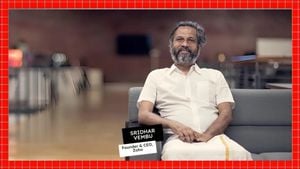On February 24, 2025, viewers of the program "Hier und Heute" were introduced to Sarah Easter, the dedicated crisis reporter for the humanitarian organization CARE. With her tireless passion for amplifying the voices of those affected by turmoil, Easter embarks on challenging journeys to the frontline of global crises, focusing on sharing the untold stories of individuals facing unimaginable hardships.
By listening attentively to those in crisis, she seeks not merely to report the facts but to convey the humanity behind every statistic. "Sie hört den Menschen dort zu und erzählt ihre Geschichten weiter," said Easter during her feature, emphasizing the importance of giving people the opportunity to share their narratives. This approach does more than inform; it cultivates empathy and often drives viewers to action.
Easter's commitment to humanitarian reporting is not just a career choice; it's rooted deeply in her belief in the power of storytelling. Her work with CARE entails entering areas ravaged by conflict, natural disaster, or economic collapse, where she engages with the local populace, gathers their stories, and presents them to the wider world.
The significance of her role cannot be overstated. Stories from the frontline can move hearts and inspire the help necessary to support these crisis-hit communities. By highlighting individual experiences within the larger framework of human suffering, Easter believes she can mobilize compassion and resources to address urgent needs.
"Crisis response is not just logistical," she explains. "It's about connecting the dots, seeing how interconnected we all are as humans." Her goal is to transcend the barriers of geography and ideology, prompting mankind to recognize our shared humanity. Each report becomes not only information but a cry for action, bridging the gap between distant struggles and the viewers' everyday lives.
Viewers also got insights from gardening expert Markus Phlippen, who showcased ways to support local wildlife, such as planting insect-friendly blooms. The juxtaposition of these segments highlighted the interconnectedness of nature and human needs, reinforcing the idea of supportive communities—both human and ecological.
Throughout her segments, Easter's thoughtful narrative, combined with expert insights, paints a comprehensive picture of not only the crises affecting lives but also how individuals can contribute positively to their communities. From practical gardening tips to stirring stories of resilience, the program offered viewers much to reflect upon.
The potential impact of Easter's work is far-reaching. By transforming personal stories of suffering and resilience from the ground, she creates awareness about the urgent need for humanitarian actions. With every report, she revitalizes public attention on the challenges faced by many worldwide, establishing dialogues between those who suffer and those who can help.
Her dedication to shining light on the darkest corners of our globe is not only inspiring; it serves as a timely reminder of the role media plays. Journalists like Sarah Easter are fundamental to bridging the gap between crisis-affected individuals and international audiences, making the invisible, visible.
Through her impactful reporting, she encourages viewers to reflect on their own capacity for empathy and action, sparking engagement and involvement within local communities. Whether through donations, volunteering, or simply being more aware of global issues, Easter's narratives encourage everyone to play their part.
Overall, Sarah Easter embodies the spirit of compassionate reporting. Her work brings urgency to our collective responsibility to care for one another across borders and backgrounds. By amplifying the voices of the vulnerable and marginalized, she not only informs but also inspires meaningful global solidarity.



